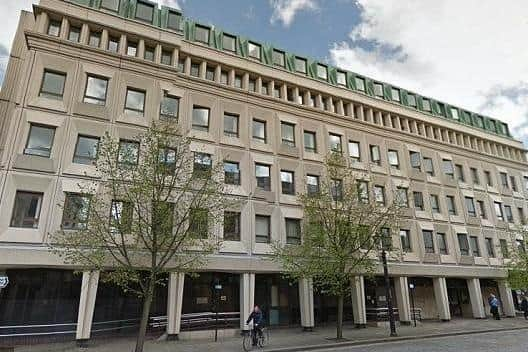‘Unacceptable’ delays as Wigan woman’s body found nearly five hours after 999 call
and live on Freeview channel 276
Bolton Coroner’s Court heard officers should have arrived at the Hindley home of Hannah Beardshaw within an hour of Greater Manchester Police (GMP) receiving a call raising concerns for her welfare on April 20.
But delays meant it was nearly five hours later that officers and paramedics got inside and the 25-year-old’s body was found.
Advertisement
Hide AdAdvertisement
Hide AdWhile a paramedic estimated Hannah had been dead for three hours, he said it was not possible to confirm exactly when she died.


Coroner Rachel Syed described the delays as “unacceptable” but could not say they contributed to Hannah’s death.
After hearing that recommendations for changes were under consultation, she expressed concerns that other lives could be put at risk.
Miss Syed will write a report about the prevention of future deaths to highlight her concerns to GMP and the Independent Office for Police Conduct (IOPC).


Advertisement
Hide AdAdvertisement
Hide AdShe said: “I have heard quite concerning evidence from the IOPC regarding specific failings on how GMP handled this particular call. What is more concerning is that it is almost a year later and no action has been taken regarding these lessons to be learned. I am told this is still in the consultation period and even after that consultation period takes place with Greater Manchester Police, there is no guarantee that these recommendations will be implemented.
"On that basis, I am satisfied that while Hannah’s death I do not believe to be preventable, there are other people where similar delays may occur and their deaths may be preventable.”
Hannah grew up in Preston and was a “happy” child, but her behaviour changed during her teens and she self-harmed, threatened to take her own life and took tablets.
She saw child and adolescent mental health services (CAMHS) for a year and her mood improved “slightly”, the inquest heard.
Advertisement
Hide AdAdvertisement
Hide AdShe moved to Hindley with her boyfriend Keith a few years later and worked as a body piercer at Affleck’s Palace in Manchester.
Hannah still had issues with her mental health, with GP appointments during 2019 and 2020 to address her low mood and anti-depressants being prescribed.
Hannah and her partner separated in March or April 2021 and she formed a relationship with Kyrin Glover.
He spent a week in Wigan with her in April and described her as “very outgoing, very positive”, but she became upset when he ended the relationship before he left on April 19.
Advertisement
Hide AdAdvertisement
Hide AdHannah phoned her former partner, now named Lexi McKie, shortly after 11.45am on April 20 and was crying and apologising.
Lexi said: “I think the thing that stood out to me most about the phone call was the fact that she asked if I would take the cat.”
She tried to phone Hannah back but she did not answer, so she called 999 at 12.36pm.
Matthew Lloyd-Evans, an investigator for the IOPC who looked into how GMP responded, said the call was ranked as a grade two response, so should be allocated in 20 minutes and arrive in an hour.
Advertisement
Hide AdAdvertisement
Hide AdA call handler contacted North West Ambulance Service (NWAS) at 12.44pm and they ranked it as category four, for an ambulance to attend within three hours or telephone triage.
NWAS’ clinical assessment service could not contact Hannah by telephone, so an ambulance was allocated at 1.45pm.
It arrived at Hannah’s home at 2.10pm, but the crew could not gain access.
Meanwhile, Mr Lloyd-Evans explained a police radio operator saw at 12.54pm that the incident had been allocated to two divisions –where Hannah lived and where the caller lived – but removed the wrong division.
Advertisement
Hide AdAdvertisement
Hide AdThis was rectified at 1.21pm and another radio operator looked at the call at 1.52pm. Background checks were done and at 2.33pm a “thrive” – a form of risk assessment – marked the call as “medium” risk.
At 2.58pm a radio operator spoke to her sergeant about escalating the incident, as they were outside the response time for grade two. While the operator had the power to move it to grade one, they did not, the inquest heard.
Police officers were allocated at 3.17pm, but did not leave immediately. They were reallocated to a higher-priority grade one incident at 3.46pm, before returning to the call about Hannah at 4.11pm.
While on their way to Hannah’s flat, the officers asked if the incident had become grade one so they could use their sirens and lights, but it had not. They also asked for a method-of-entry officer to attend to get into Hannah’s home, but this was refused.
Advertisement
Hide AdAdvertisement
Hide AdGMP had received four calls from NWAS asking for help to get into the flat – at 2.26pm, 3.14pm, 3.58pm and 4.14pm.
The police arrived at 4.40pm but could not get inside, so requested the method-of-entry officer. He went to Leigh police station for equipment before reaching Hindley at 5.17pm.
Police and paramedics finally got into the flat and found Hannah in a bedroom.
Paramedic Mike Wilson was called at 5.30pm and arrived at 5.33pm, pronouncing Hannah dead a few minutes later.
Advertisement
Hide AdAdvertisement
Hide AdHe said she had died at least three hours earlier, but it was “impossible” to comment on if she was alive when the 999 call was made.
A post-mortem examination confirmed Hannah died by hanging.
Mobile phone analysis showed she had done searches on taking her own life at 3.10pm, 3.52pm and 4.06pm on April 19.
A three-page note was found, which detailed her struggles and instructions for the care of her cat.
Advertisement
Hide AdAdvertisement
Hide AdMr Lloyd-Evans said failings had been identified in GMP’s response, including the incident not being escalated when an officer was not allocated within 20 minutes.
Several learnings had been identified and consultation was taking place on whether changes should be implemented. This included having entry kits in cars so officers are not delayed.
Miss Syed concluded Hannah died by suicide.
